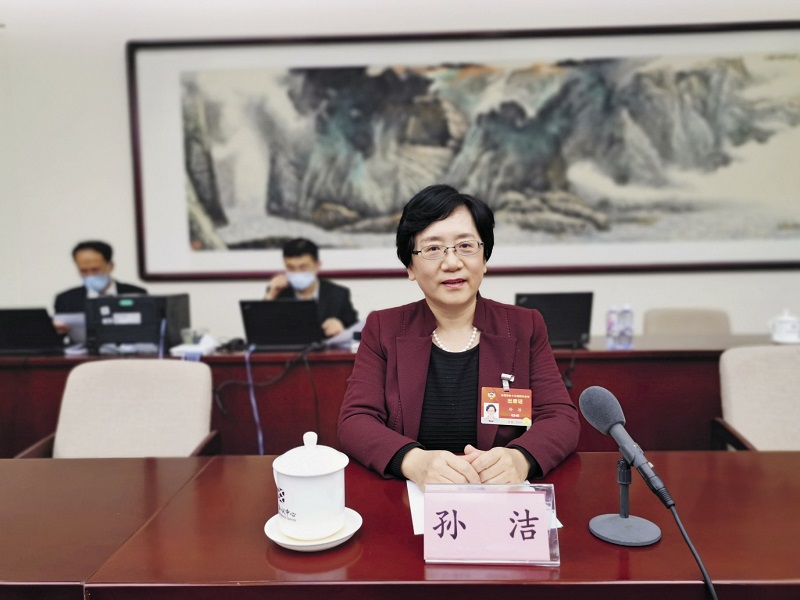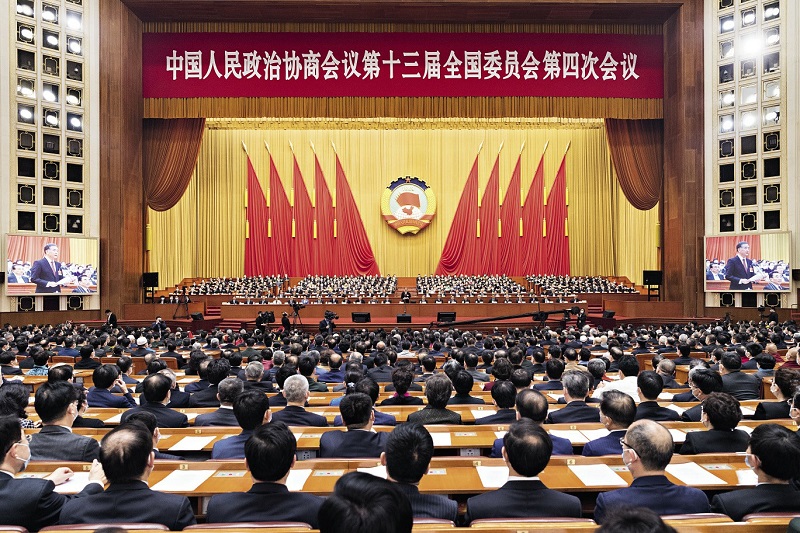Not long ago, Beijing launched a pilot insurance system for severely disabled people. Sun Jie and her three proposals tell us more about the story.

Sun Jie, a member of the National Committee of the CPPCC.
A government-subsidized insurance program for senior people in need of long-term nursing care has been applauded since its launch on a trial basis in Shijingshan District of Beijing. With the program, seniors living with serious physical disabilities have a large part of their bills for daily care covered by insurance. Gradually, the pilot program will be extended to cover mentally challenged residents based on the capabilities of the local government in providing insurance services.
Behind the successful implementation of the insurance program is a political advisor who has been working to find an affordable solution to long-term care for seniors lacking the ability of independent living. She is Sun Jie, a member of the National Committee of the Chinese People’s Political Consultative Conference (CPPCC) and deputy dean of the school of insurance at the University of International Business and Economics.

A local citizen casting her vote for the director, deputy director, and committee members of a community at a voting booth in Wuhan, on December 14, 2021.
Thoughts Sparked at a Seminar
Back in April 2012, Sun was invited to a seminar on long-term care insurance held by the then Ministry of Health. At that time, a few experts at the meeting suggested the establishment of a public insurance system for long-term care given a rapidly aging population. However, they overlooked problems regarding fund raising for such a program.
Sun had gained in-depth understanding of long-term care insurance through her daily teaching and research experience. “It is an insurance product with social security functions, but China was not prepared to make it part of its social security system. A wiser move at the time was to encourage commercial insurance companies to offer such products, and include the insurance in the benefit package for working population,” she recalled.
Long-term care insurance have been well-developed in developed countries. They have played an important role in spreading and transferring the pressures and risks faced by the national basic endowment insurance, stabilizing labor relations, improving the living standards of retirees, and promoting the development of the financial service industry and capital market.
Internationally, there are two main public models used to cover senior people in need of long-term nursing care in insurance programs. The first model is typically adopted by Germany and Japan, both of which incorporate the group into the social security system. The second model is represented by the United States, which encourages private insurance companies to develop insurance products for such groups. Sun Jie said, “It was not realistic back then either to include this insurance in the basic social security system or to let private insurance companies develop a new type of insurance product.”
“I disagreed at the meeting for practical reasons,” Sun said. First, it was difficult to decide on whether this insurance program should be universal or selective, she said. “If it were universal, how would the huge gap in the payment capacity of urban and rural residents be dealt with? Who would pay the contribution for the poor? How should the needs of people with different health conditions be addressed? If the insurance only covered urban workers, it would go against the goal of making a social security system equally accessible to all,” Sun recalled.
Second, it was difficult to decide on the source of funding, and the proportion of contribution. Sun said that funding is key to establishing a system for long-term care insurance. “At present, businesses in China are paying for their employees’ various insurance programs – endowment insurance, medical insurance, unemployment insurance, employment injury insurance, and maternity insurance. They also contribute payment to employees’ housing provident fund, and annuity. All of these contributions account for more than 40 percent of the total wage employers pay to their employees. Thus, it may be difficult for the enterprise to bear the cost of an additional insurance program.”
Third, it was difficult to determine the eligibility of beneficiaries. “Should it offer reimbursement to all people aged 60 like the pension insurance does, or should it be based on the actual needs of the insured? If the latter were chosen, what should be the criteria?” said Sun, adding that all of these problems should be solved before launching such an insurance program.
“After that seminar, I continued thinking about how to contribute my expertise and make such insurance a reality as soon as possible.”
Proposal Put Forth on Three Occasions
In 2013, Sun Jie was elected a member of the 12th National Committee of CPPCC. She submitted a proposal on promoting long-term care insurance programs targeting the elderly with taxation incentives to the CPPCC session. In July of the same year, she received a reply from the China Insurance Regulatory Commission on the proposal. “This gave me hope,” she said.
Two years later, Sun upgraded her proposal and brought it to the CPPCC session once again. On July 3, 2015, she received a reply from the National Committee on Aging under the State Council. “The response letter said that the competent authorities will further improve the country’s medical insurance system, expand the coverage of the basic medical insurance scheme, devote greater energy into the study of long-term care insurance targeting the elderly,” Sun said. From the response letter, she knew that the issue had drawn due attention from the top policy-making level. “The launch of long-term care insurance will benefit hundreds of millions of people living with physical difficulties,” Sun said.
To strike the iron while it was still hot, Sun renewed the proposal and brought it up at the 2016 CPPCC session. “This time, I recieved a response from the Ministry of Human Resources and Social Security, which replied to me after consulting the Ministry of Civil Affairs, the Ministry of Finance, and the central health authority. I knew such a program will become a reality as it had been on the agenda of various functional departments,” Sun said. The Ministry of Human Resources and Social Security said in the reply that pilot programs can be implemented first and that experiences at home and abroad can be consulted in launching such an insurance scheme.
Days later, the Ministry of Human Resources and Social Security released guidelines for pilot programs of long-term care insurance.

Representatives listen attentively during the Fourth Session of the 13th National Committee of the CPPCC at the Great Hall of the People in Beijing, on March 10, 2021.
Renewed Commitment for Unchanged Cause
Sun’s due diligence as a political advisor made her re-elected a member of the 13th National Committee of the CPPCC in 2018. “My focus over the new term shifted to expanding the pilot programs nationwide,” Sun said.
Her proposal at the 2019 CPPCC session was about building a mechanism for stable and sustainable funding for long-term care insurance. According to the joint reply given by the National Healthcare Security Administration, the Ministry of Finance, and the Ministry of Human Resources and Social Security, by the end of June 2019, the number of people covered by the pilot programs in 15 cities and two provinces had reached 88.54 million; 426,000 people had had their cost of daily care reimbursed by the scheme; and the annual reimbursement amount per person had recorded around RMB 9,200.
In the 2019 report on the work of the government, the Chinese government pledged to expand the pilot programs. “All together, there are around 50 cities implementing a long-term care insurance scheme,” Sun said.
Stable funding is fundamental to the long-term care insurance scheme, and the focus of Sun’s current work as a political advisor. “At the beginning of piloting the scheme, I proposed that the funding should come from various sources given different financial standing of each pilot city,” Sun said. A widely adopted approach is to use the surplus of the basic medical insurance fund for working urban residents and increasing the contribution to the fund by both employers and employees, according to Sun. “But the problem with the funding approach is mismatched contribution and reimbursement responsibility.”
According to Sun, the long-term care insurance should be a public scheme. As for the fund-raising mechanism, the reply to her 2019 proposal offered some options. The first is to set up a totally new scheme operated independently from the current basic medical insurance scheme. The second is to make the employers and individuals main sources of the funding. Government support to the funding should be based on the level of economic development, according to the reply.
“The introduction of a long-term care insurance system has been included in the 14th Five-Year Plan (2021-2025), and I believe by 2025, the coverage of the scheme will have been expanded to the entire population. By that time, not only people aged above 60, but also all of those living with disabilities will enjoy the benefits of the scheme,” Sun said.